Midterm elections in Florida: Key dates and changes to voting in 2022

New redistricting maps impact Florida candidates
Two Democratic candidates for Congress in Pinellas County have stopped their campaigns and dropped out because of Florida's new redistricting map. Voting groups have sued and a state judge ruled it unconstitutional and blocked it. Now, the governor is appealing the decision and the judge's ruling is on hold.
TAMPA, Fla. - Primaries for Florida's 2022 Midterm Elections are only weeks away and while there may not be a choice for president on the ballot, there are plenty of elected offices – from Washington D.C. to local government councils – for which voters may make their voices heard.
After a contentious redistricting process, many Floridians have likely received new voter registration cards in the mail, informing them of a change in their polling location. However, voting by mail is the preferred method for many in the Sunshine State.
MORE: 2022 midterm election sample ballots: Know the candidates before casting your vote
Supervisors of Elections across the state are encouraging voters to make a plan early for when, where, and how they will register and cast ballots.
Below is a guide to help Florida voters navigate the 2022 Midterm Elections.
RELATED: More than 1 million voters switched to Republican Party over the last year
Register to vote in Florida
The fastest way to register to vote in Florida is on the state Supervisor of Elections website, https://registertovoteflorida.gov/home.
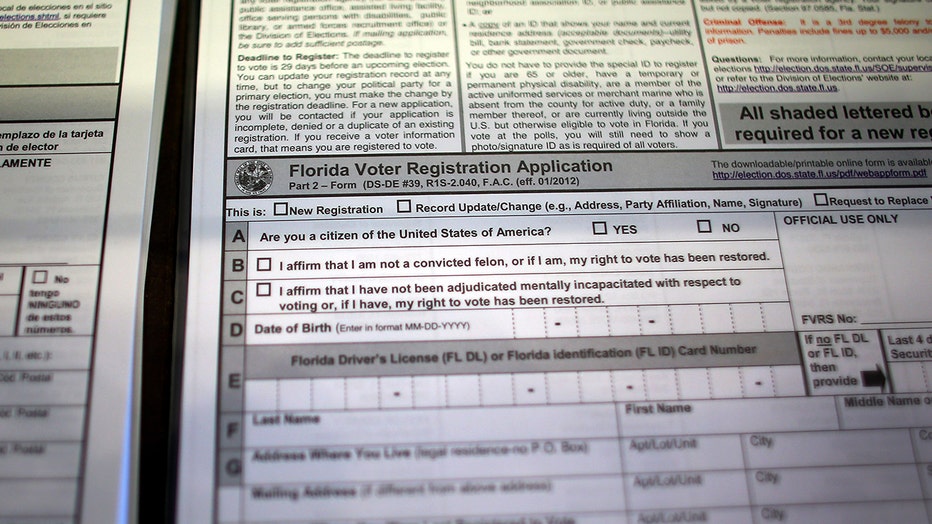
A Florida Voter Registration Application sits at the Miami-Dade Elections Department on October 1, 2012 in Miami, Florida. (Photo by Joe Raedle/Getty Images)
Those who wish to fill out a paper application may do so by using the PDF provided by the state or visiting any supervisor of elections' office, office that issues driver's licenses and other agencies approved to register voters, such as libraries, military recruitment offices, libraries and assisted living facilities.
Those who wish to register to vote must:
- Be a citizen of the United States of America;
- Be a legal resident of Florida;
- Be a legal resident of the county in which they seek to be registered;
- Be at least 16 years old to preregister or at least 18 years old to register and vote;
Those who have been adjudicated mentally incapacitated and/or those who are convicted felons and have not had their voting rights restored are not eligible to register to vote in Florida.
The deadline to register to vote in an election is 29 days before that election.
Florida's Primary Elections are August 23, so the deadline to register is July 25.
The general election is November 8, so the deadline to register is October 11.
Anyone may check their Florida voter registration at registration.elections.myflorida.com/CheckVoterStatus.
How to vote in Florida
There are two primary means of voting in Florida: in-person and by mail.
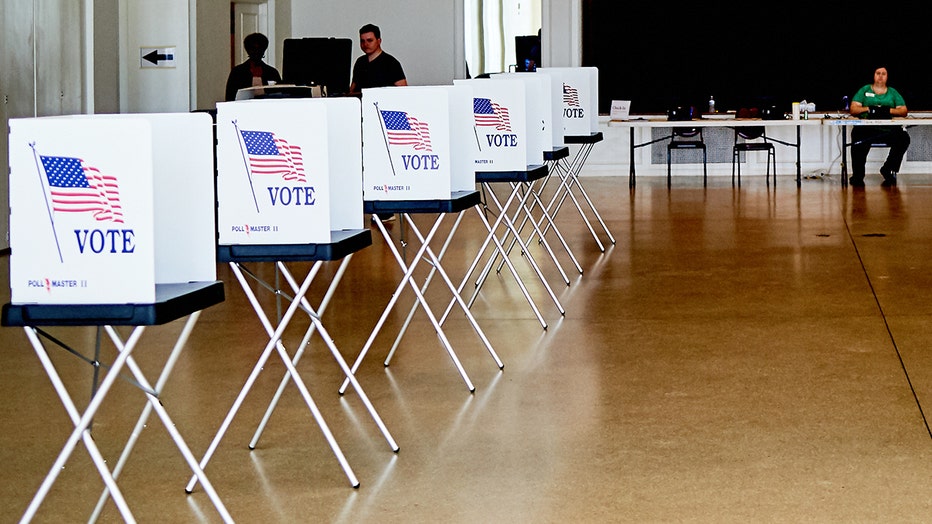
TAMPA FLORIDA MARCH 17: Voting stations are seen empty during Florida's primary election at the Tampa Garden Club voting precinct on Tuesday, March 17, 2020 in Tampa Florida. Polling volunteers say that in-person turnout is down at most locations due
Vote-by-mail
Many Floridians choose to vote by mail, formerly known as absentee voting.
Mail ballots may be requested from a voter's county Supervisor of Elections office. Most counties offer online, phone, and in-person options to make the request, which must be done at least 10 days prior to any given election and will be mailed to the voter within two days of the request.
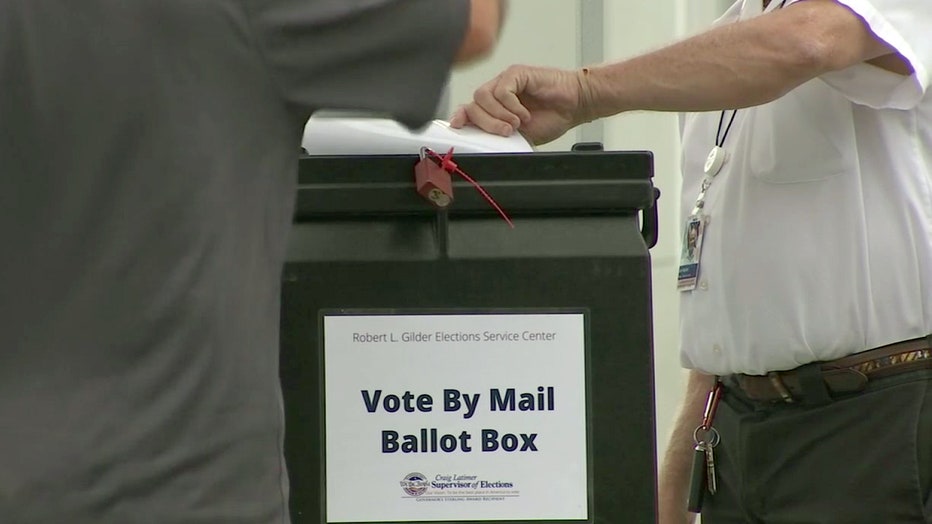
Voters may also pick up vote-by-mail ballots at their county Supervisor of Elections office once the ballots become available. Or voters may designate someone to pick up a mail ballot on their behalf, but they must fill out an affidavit. Visit https://dos.myflorida.com/elections/for-voters/voting/vote-by-mail/ for more information.
Anyone who requests a vote-by-mail ballot may check the status of that ballot on their county's Supervisor of Elections website or on the state's elections website.
Check each county's Supervisor of Elections website for information about voting by mail.
In-person
Voting in person may be done on Election Day or during early voting days, depending on the county. Voters must bring a photo ID with a signature or signature verification.
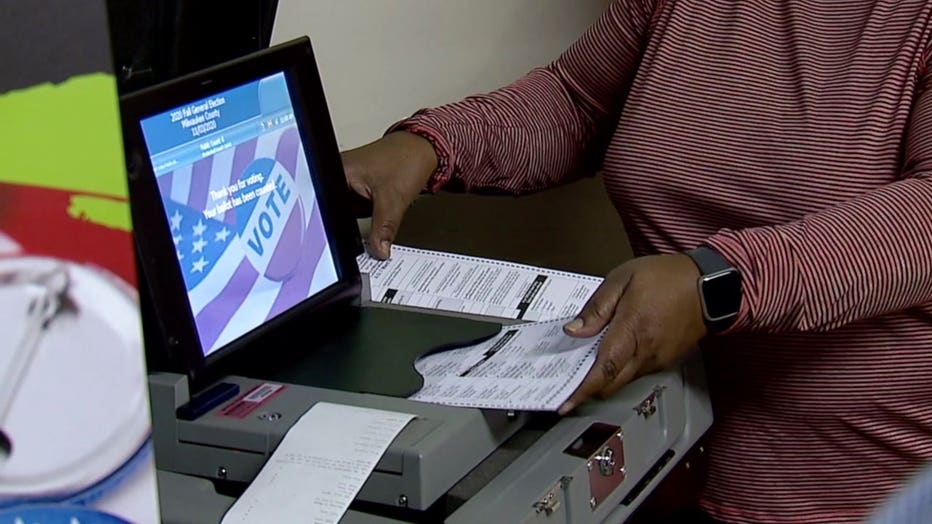
Due to redistricting across the state, many Floridians may find their voting location has changed. Supervisors of Elections mailed or will mail new voter registration cards with updated voting locations to voters registered in their counties.
Voters who have not received an updated voter registration card should check their local Supervisor of Elections' website for in-person voting information.
Where to vote in Florida
In-person voting is typically held in schools, churches, and community centers around each county in Florida. When Florida's Congressional maps changed during the redistricting process, many voters' polling locations changed, too.
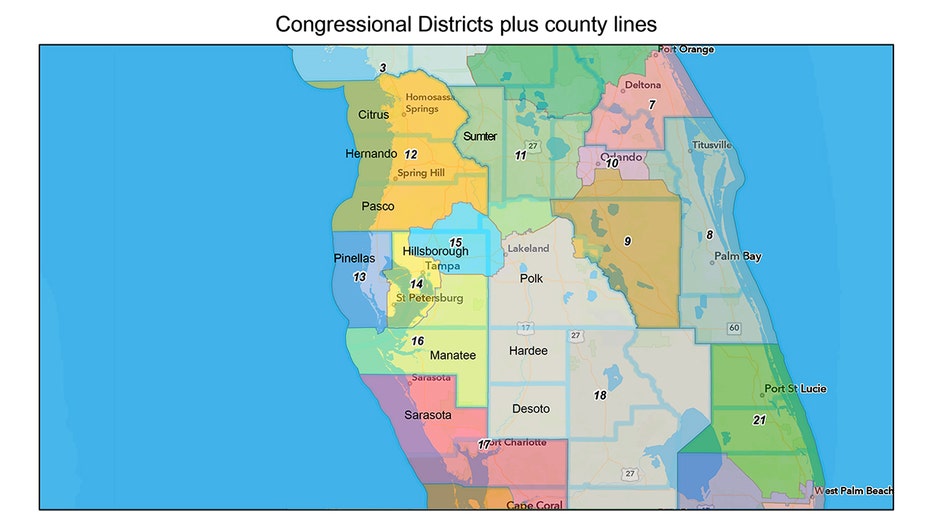
View of Central Florida Congressional Districts for the 2022 Election, with county line demarcations and Bay Area county names
There are several ways to find out where you are able to vote in-person in Florida.
Call or visit the website for your county's Supervisor of Elections.
Check your voter registration card. Most Supervisors of Elections have mailed registered voters an updated card in the recent weeks. Anyone who has not received an updated card is advised to contact their Supervisor of Elections or check their voting status online.
When to vote in Florida
There are multiple ways and locations for Florida voters to cast their ballots. The final piece of the puzzle is when ballots can and should be cast.
Florida's Primary Election is August 23, 2022.
Florida's General Election is November 8, 2022.
Submitting mail ballots
A vote-by-mail ballot must be received by the Supervisor of Elections' office, regardless of postmark, no later than 7 p.m. (local time) on Election Day. The United States Postal Service recommends U.S. voters mail back their voted ballots at least one week before Election Day to account for any unforeseen events or weather issues.
Instructions for returning mail ballots are included with the ballot packet.
Mail ballots require a signature that matches the signature on a voter's government-issued ID. A Supervisor of Elections is required to notify the voter if their signature is missing or does not match the one on record. Once a voter learns about the missing or mismatched signature, the voter may complete and return a Vote-by-Mail Ballot Cure Affidavit.
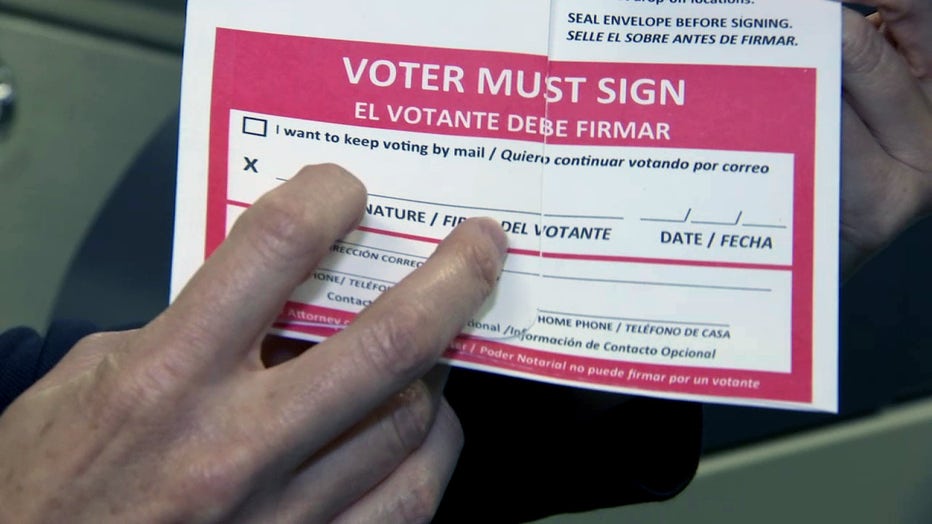
Vote-by-mail ballots may be returned to secure ballot intake stations, also known as vote-by-mail ballot drop boxes. Intake stations are required to be placed at Supervisors of Elections’ offices, at each branch office, and at designated early voting sites in the county during the early voting period.
If someone receives a mail ballot but does not submit it via USPS or an early voting location before Election Day, they may take their ballot to their designated polling place or another location designated by the voter's county Supervisor of Elections on Election Day.
Early in-person voting
Early voting starts at least 10 days before the election and ends three days before the election in the state of Florida. Supervisors of Elections are allowed to offer extended early voting up to 15 days before an election. Voters should check with their local elections office for details about in-person early voting.
In-person voting on Election Day
With so many options to vote early, including by mail, Florida voters are encouraged not to wait until Election Day to cast their ballots. However, for anyone who hasn't yet had the chance to make their choices, voters may cast their ballots on Election Day at their designated polling place, which may have changed since the last election.
Voters should check their county Supervisor of Elections' website for information about in-person voting on Election Day.
Who's on the ballot in Florida
The 2022 Midterm Elections include federal, state, and local/municipal races.
Every Florida voter will see candidates for U.S. House (all districts), U.S. Senate (one of two seats), governor, lieutenant governor, attorney general, chief financial officer, agriculture commissioner, FL House (all districts) and FL Senate (all districts).
In 2020, there were nine political parties with which voters and candidates could register, or they could choose ‘no party affiliation.’ The majority of Florida voters register with one of the two major parties – Democrat or Republican – or with no party affiliation.
U.S. House
All 28 of Florida's U.S. Congressional Districts have positions on the ballot for the Primary and General Elections in 2022.
Due to redistricting, voters may see familiar names or a new slate of potential candidates on this year's ballot.
View an interactive map of Congressional Districts in Florida by clicking here.
View a full list of Florida's candidates for the U.S. House of Representatives by clicking here.
U.S. Senate
One of Florida's two United States Senate seats are up for election in 2022.
The incumbent, Republican Senator Marco Rubio, was elected to the seat in 2011. He does not face a challenger in the Primary.
Democrats will have several candidates to choose from. Ricardo De La Fuente, Val Demings, Brian Rush and William Sanchez will be on the Primary ballot.
One candidate with the Libertarian Party of Florida will be on the ballot: Dennis Misigoy. There are also four write-in candidates: Uloma Uma Ekpete, Edward A. Gray, Howard Knepper, and Moses Quiles – and two candidates with no party affiliation: Steven B. Grant and Tuan TQ Nguyen.
Attorney General
Republican incumbent Ashley Moody is running unopposed in the Primary for Florida Attorney General.
Democrats Aramis Ayala, Jim Lewis and Daniel Uhlfelder are running to be Moody's opponent.
Chief Financial Officer
Republican Incumbent Jimmy Patronis and Democrat Adam Hattersley are both running unopposed in their Primaries and will appear on the General Election ballot.
Commissioner of Agriculture
With current agriculture commissioner Nikki Fried throwing her hat in the ring to be the Democratic candidate for Florida governor, voters for both major parties will have options on the Primary and General Election ballots.
Democrats Naomi Esther Blemur, J.R. Gaillot and Ryan Morales, and Republicans James W. Shaw and Wilton Simpson will appear on the Primary ballot.
Governor
Incumbent Governor Ron DeSantis, a Republican, is running unopposed in the Primary Election.
Democrats Charlie Crist, Candace Daniel, Nicole "Nikki" Fried (current agriculture commissioner) and Robert L. Willis will be on the Primary Election ballot.
Three candidates with no party affiliation – Carmen Jackie Gimenez, Jodi Gregory Jeloudov and Hector Ross – will be on the Primary Election ballot, as well as two write-in candidates – Kyle KC Gibson and James Thompson.
All Florida voters will also see retention elections for appointed judges and State Supreme Court justices whose terms expire in January 2023, and therefore have to retain their seats through the election process.
State Supreme Court
State Supreme Court justices, which are listed as nonpartisan, are appointed by governors. Every six years, they go on ballots for voters to decide if they will retain their seat. In 2022, five justices are up for retention:
- Charles Canaday, who was appointed by Charlie Crist, who was Republican at the time, in 2008
- Ricky Polston, who was appointed by Charlie Crist (then Republican) in 2008
- Jorge Labarga, who was appointed by Charlie Crist (then Republican), in 2009
- John D. Couriel, who was appointed by Ron DeSantis (R) in 2020
- Jamie Rutland Grosshans, who was appointed by Ron DeSantis (R) in 2019

